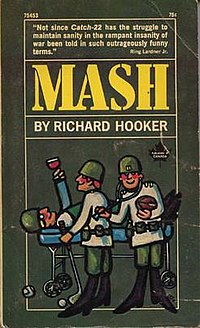Prostrators of the Sybarites,
I can be the most patient person in the world but I have no patience for filums, I can begin watching them and walk away. I tire of saying behind ever filum is a better book. I once devoted the en ergy of a lifetime to staying up to stupid o’clock to watch Catch-22 on some dire filum channel and it meant nothing.
ergy of a lifetime to staying up to stupid o’clock to watch Catch-22 on some dire filum channel and it meant nothing.
More than 30 years after the event, I am captivated by M*A*S*H, the TV series. I decided to read the book that spawned the filum which spawned the TV series, because that’s what I do. Many people are besotted by television, that’s understandable, but the content of that viewing is what defines a person. There’s so much throwaway television, M*A*S*H carries weight and means something.
I couldn’t help but feel when reading M*A*S*H by Richard Hooker, that it was lending itself to the TV series even then despite the chronological flip in the order to which I arrived at them, and I suppose this is a compliment to the foresight of Larry Gelbart, creator of the TV series, and his writers. Of course, the characters of the novel are quite different from those in the TV series, and I believe that it is the talent of the cast because they gave Hawkeye, Henry Blake, Trapper, Radar and the others consciences.
The novel is a worthwhile read, it has humourous moments but as the books concentrates more on the off-duty activities in which these comical situations arise, the moral weight which the TV series or analogous literary works, such as Catch-22 or Slaughterhouse-Five, expound is not conveyed so strongly.
I know what scientists are like and there’s every chance that the doctors did behave as those depicted in this novel did in their free time: golf, football, poker and not enough moping about missed families or anger towards the governments who placed them there. In this factual work of fiction, it may be that the working conditions were so horrendous and the periods of intensive life-saving labour were so monotonous that the moments of release were the most memorable. I know from arguments with a colleague last week that memories are selective, the memories themselves are oxidised with time, composites of partial truths.
In this age, recollections of history, factual, fictitious or a fusion of the two, presented elegantly so as to promote benevolence in the minds of its consumers and that make its consumer appreciative of such selfless acts, such as M*A*S*H, the novel and the TV series, are precious.
 ergy of a lifetime to staying up to stupid o’clock to watch Catch-22 on some dire filum channel and it meant nothing.
ergy of a lifetime to staying up to stupid o’clock to watch Catch-22 on some dire filum channel and it meant nothing.More than 30 years after the event, I am captivated by M*A*S*H, the TV series. I decided to read the book that spawned the filum which spawned the TV series, because that’s what I do. Many people are besotted by television, that’s understandable, but the content of that viewing is what defines a person. There’s so much throwaway television, M*A*S*H carries weight and means something.
I couldn’t help but feel when reading M*A*S*H by Richard Hooker, that it was lending itself to the TV series even then despite the chronological flip in the order to which I arrived at them, and I suppose this is a compliment to the foresight of Larry Gelbart, creator of the TV series, and his writers. Of course, the characters of the novel are quite different from those in the TV series, and I believe that it is the talent of the cast because they gave Hawkeye, Henry Blake, Trapper, Radar and the others consciences.
The novel is a worthwhile read, it has humourous moments but as the books concentrates more on the off-duty activities in which these comical situations arise, the moral weight which the TV series or analogous literary works, such as Catch-22 or Slaughterhouse-Five, expound is not conveyed so strongly.
I know what scientists are like and there’s every chance that the doctors did behave as those depicted in this novel did in their free time: golf, football, poker and not enough moping about missed families or anger towards the governments who placed them there. In this factual work of fiction, it may be that the working conditions were so horrendous and the periods of intensive life-saving labour were so monotonous that the moments of release were the most memorable. I know from arguments with a colleague last week that memories are selective, the memories themselves are oxidised with time, composites of partial truths.
In this age, recollections of history, factual, fictitious or a fusion of the two, presented elegantly so as to promote benevolence in the minds of its consumers and that make its consumer appreciative of such selfless acts, such as M*A*S*H, the novel and the TV series, are precious.

0 Comments:
Post a Comment
<< Home